The ggcolormeter package provides a single function guide_colormeter(), which is a ggplot2 color/fill legend guide extension in the style of a dashboard meter.
Installation
install.packages("ggcolormeter")
# or
remotes::install_github("yjunechoe/ggcolormeter")Simple usage
library(ggplot2)
library(ggcolormeter)
theme_set(theme_classic())
p <- ggplot(mtcars, aes(drat, hp)) +
geom_point(aes(color = mpg))
p +
scale_color_viridis_c(
option = "inferno",
breaks = scales::breaks_pretty(10),
guide = guide_colormeter()
)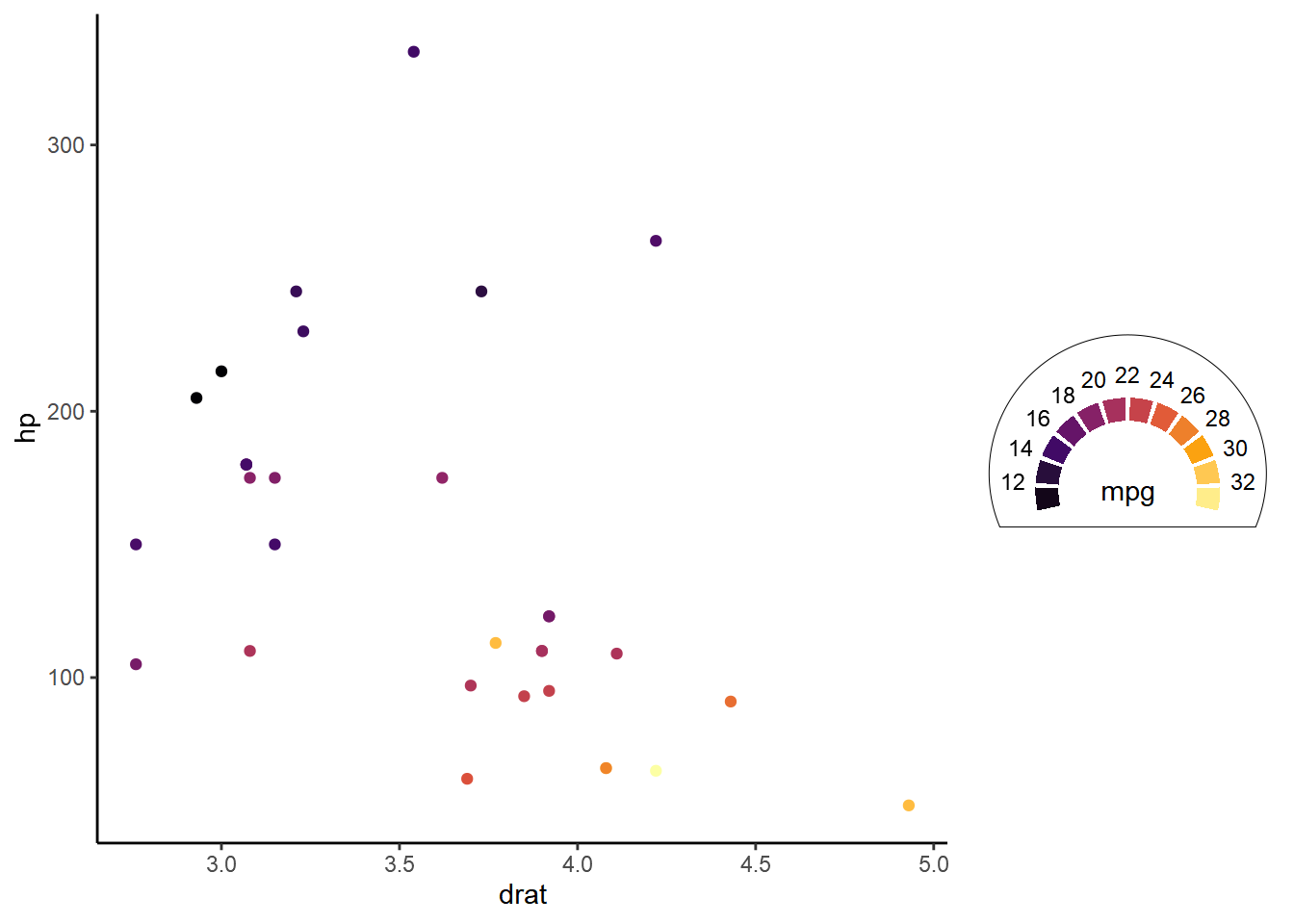
Colormeter guide theme components
The colormeter guide has argument families for styling 5 distinct components of the guide:
Position of these theme elements is relative to the guide-internal coordinate system, which you can inspect with the debug = TRUE argument.
1) Size and aspect
The colormeter legend is a bit pecular in that its size doesn’t expand with more keys: the colormeter has a fixed size and shape, and its elements are packed inside it.
You can primarily control the size of the legend with legend_size and aspect.ratio
p +
scale_color_viridis_c(
option = "inferno",
breaks = scales::breaks_pretty(10),
guide = guide_colormeter(
legend_size = unit(3, "cm"),
aspect.ratio = .8
)
)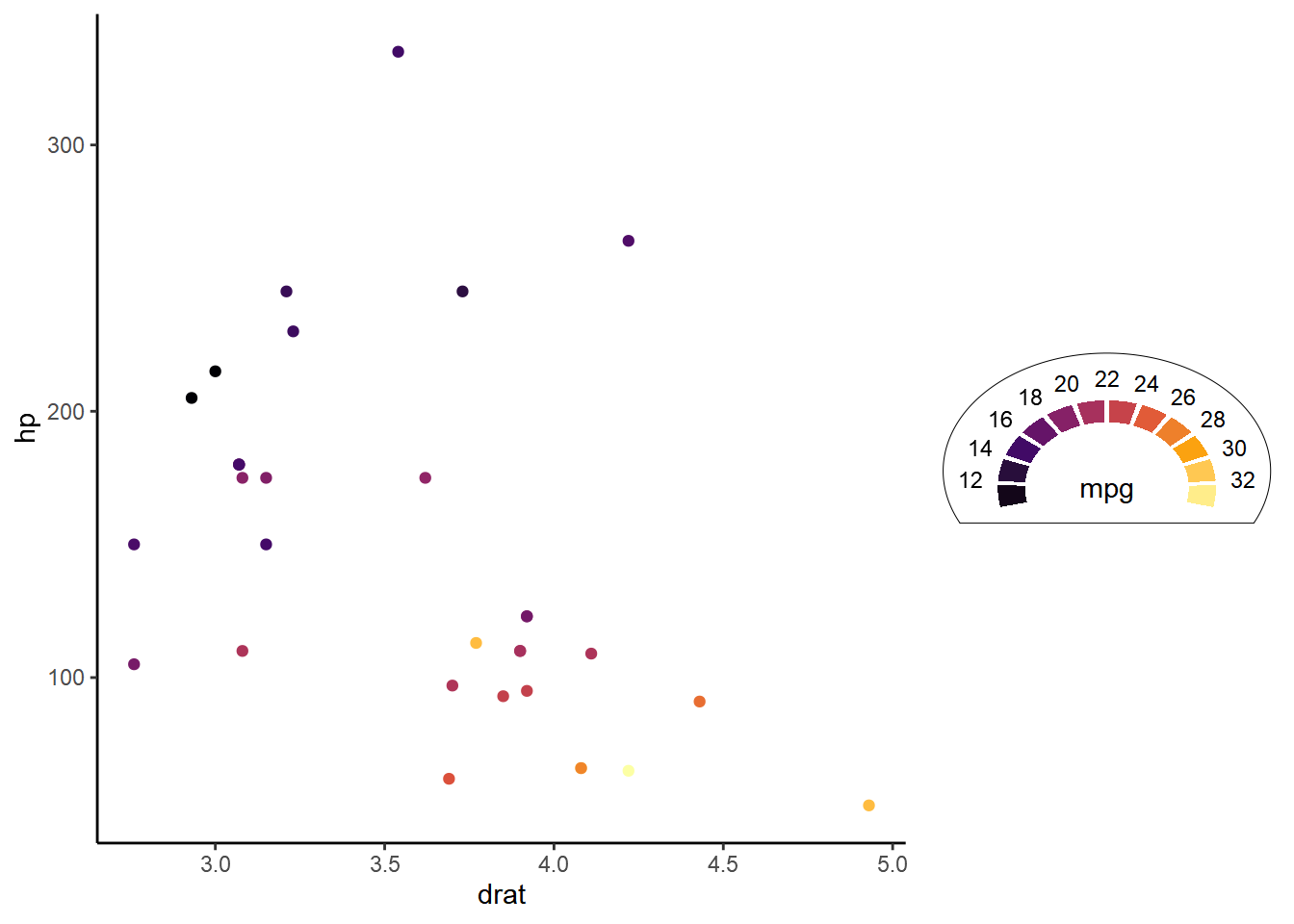
Note that the usual legend background is still present and different from the dashboard circle:
p +
scale_color_viridis_c(
option = "inferno",
breaks = scales::breaks_pretty(10),
guide = guide_colormeter(
legend_size = unit(3, "cm"),
aspect.ratio = .8
)
) +
theme(legend.background = element_rect(color = "red", fill = "pink"))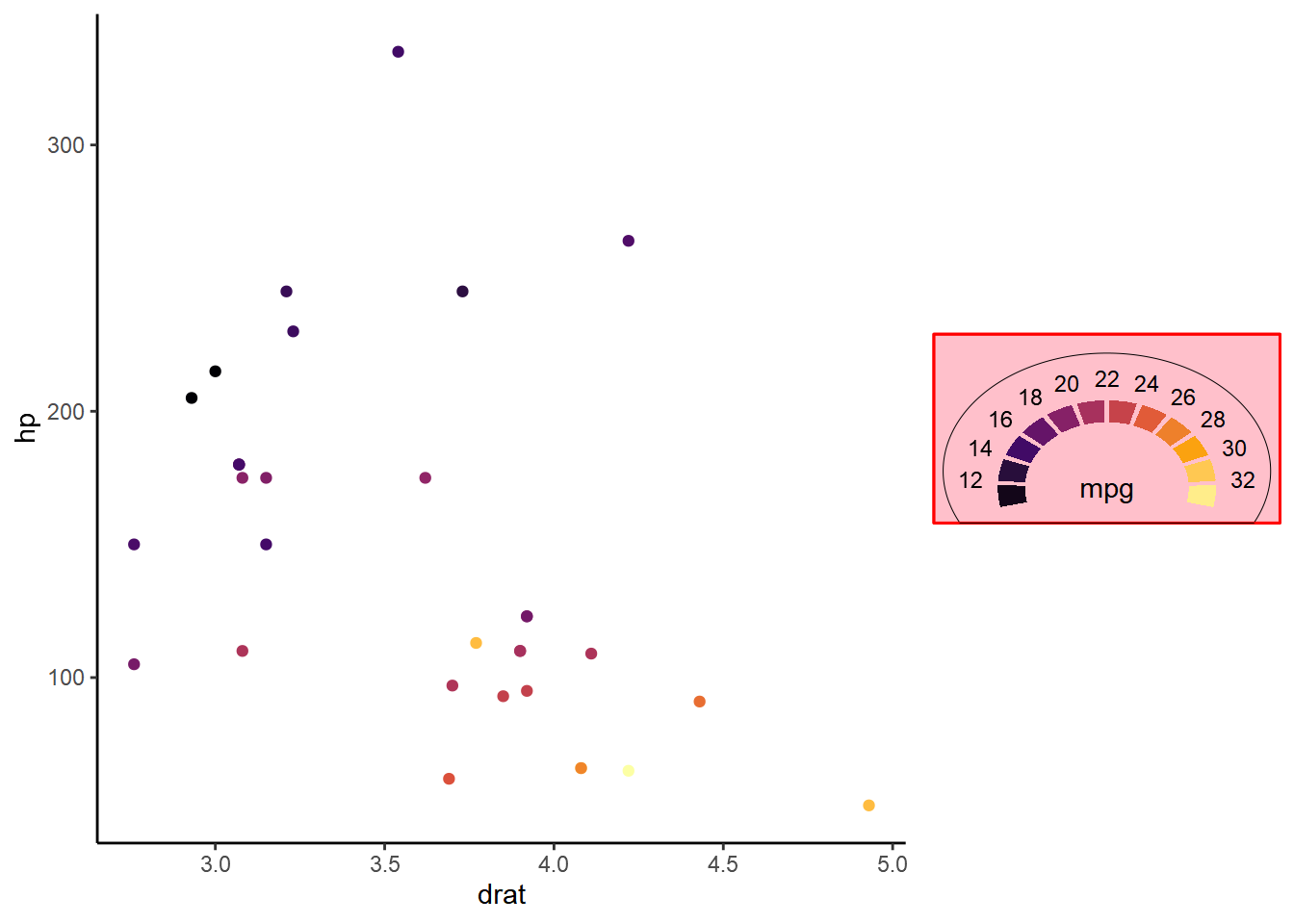
Most of the time you’d want to remove this legend background, as the dashboard serves that purpose:
p +
scale_color_viridis_c(
option = "inferno",
breaks = scales::breaks_pretty(10),
guide = guide_colormeter(
)
) +
theme(
legend.position = c(.85, .75),
legend.background = element_blank()
)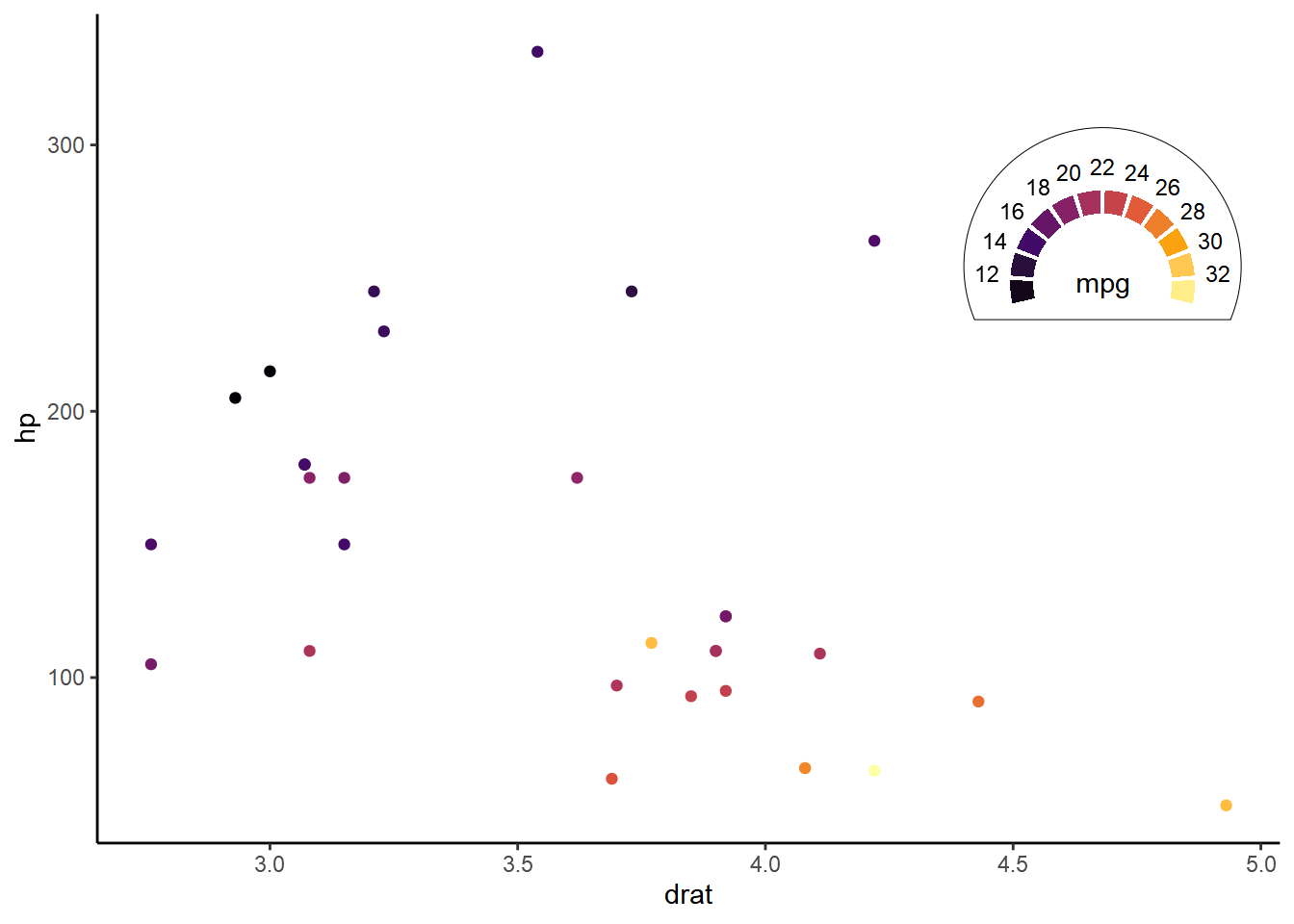
2) Arc
formals(guide_colormeter)[grepl("arc", names(formals(guide_colormeter)))]
#> $arc_range
#> c(-4/7 * pi, 4/7 * pi)
#>
#> $arc_radius
#> [1] 1
#>
#> $arc_width
#> arc_radius/4
#>
#> $arc_gap
#> arc_radius/5
#>
#> $arc_rounding
#> [1] 0Non-positional aesthetic arguments for the color arc:
p +
scale_color_viridis_c(
option = "inferno",
breaks = scales::breaks_pretty(10),
guide = guide_colormeter(
arc_width = 1/6, # thinner arcs
arc_gap = 1/3, # bigger gaps
arc_rounding = 0.03 # rounded corners
)
)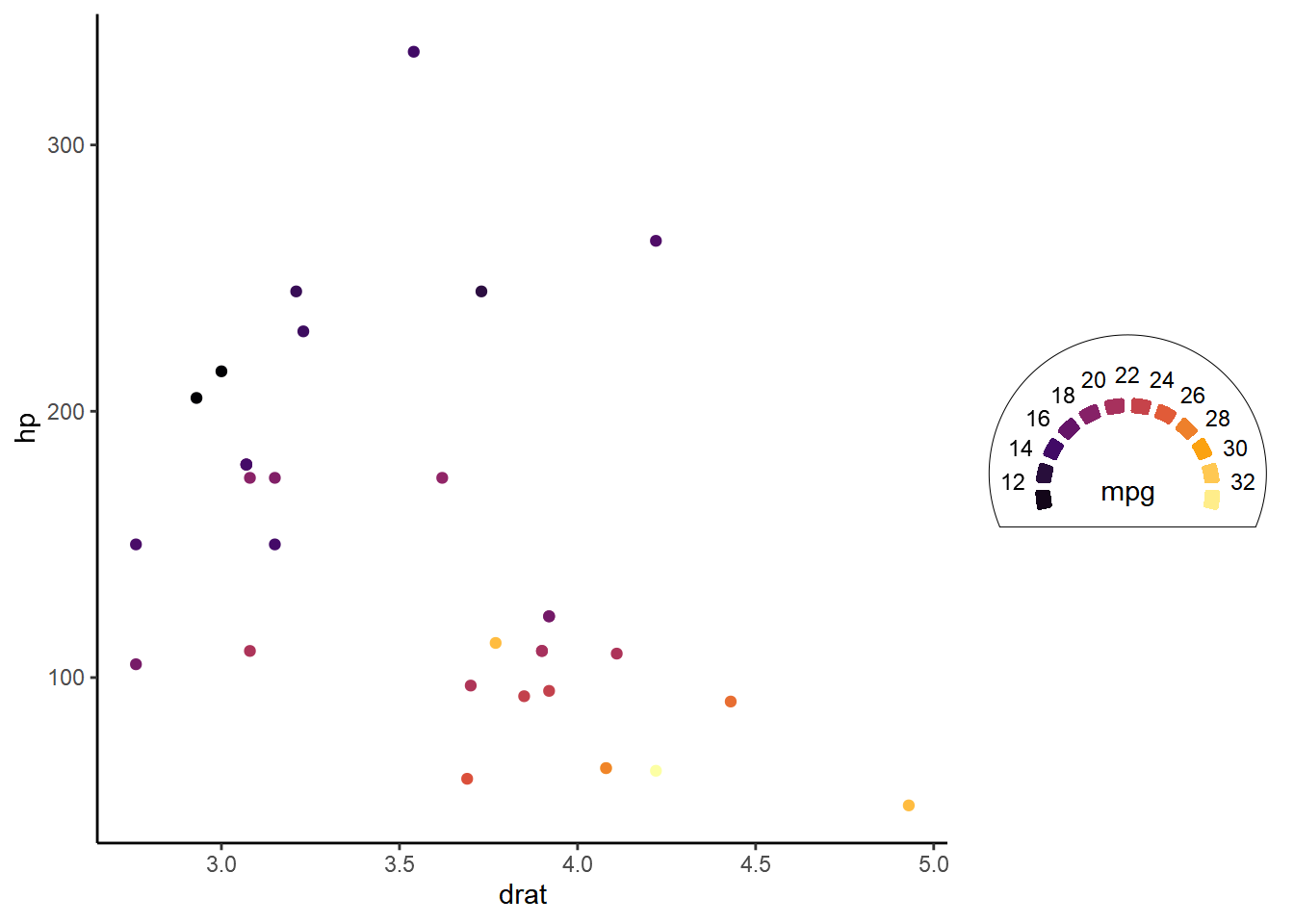
By default, label and dashboard radii are derived from arc_radius:
p +
scale_color_viridis_c(
option = "inferno",
breaks = scales::breaks_pretty(10),
guide = guide_colormeter(
arc_radius = 1.2
)
)
You can use arc_range to set the start and end angles of the color meter, which may yield different shapes:
p +
scale_color_viridis_c(
option = "inferno",
breaks = scales::breaks_pretty(5), # half the arcs
guide = guide_colormeter(
arc_range = c(-pi/2, 0) # quarter circle
)
)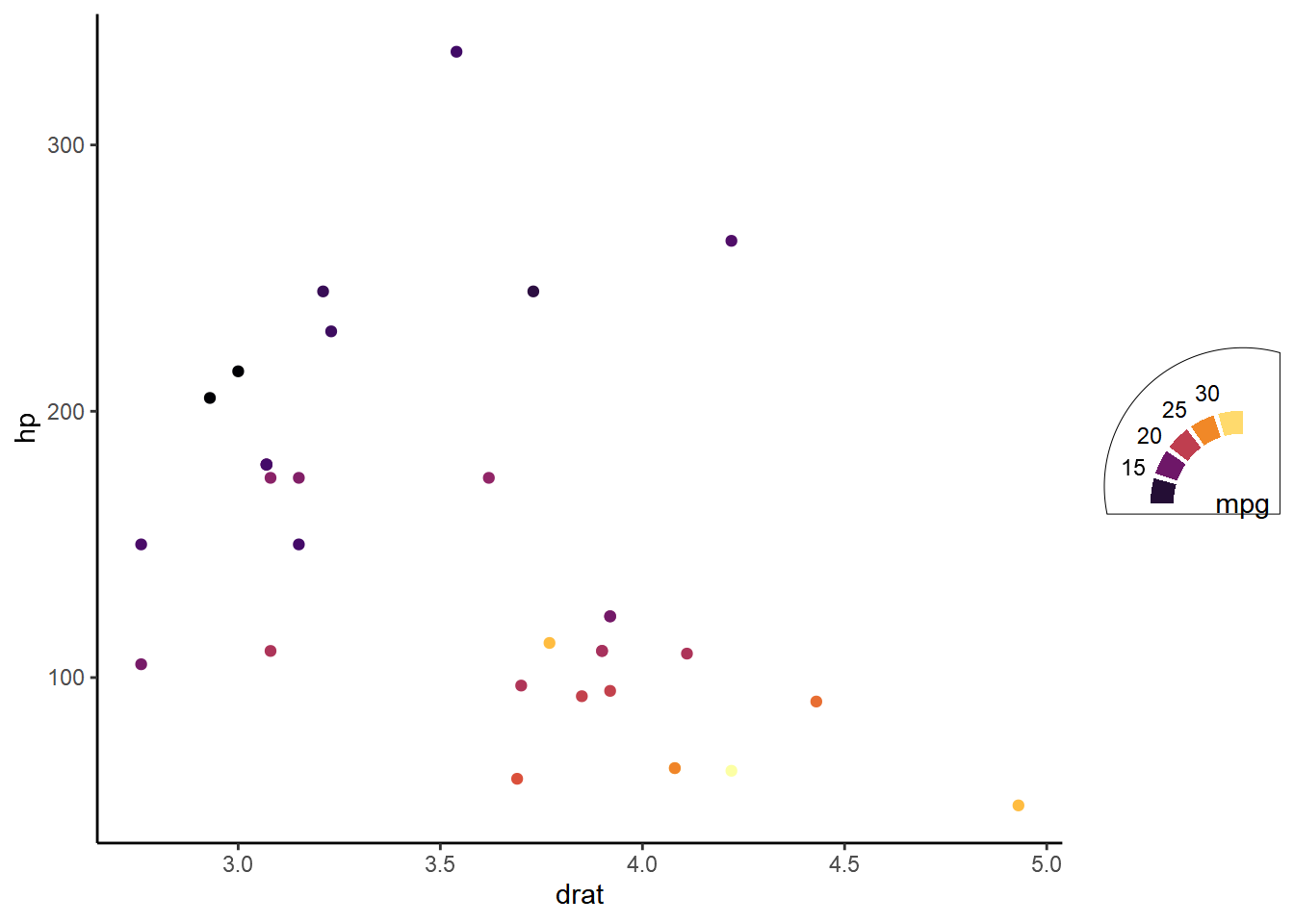
The defaults aren’t great for when you change from the dashboard shape. Some manual adjustments may be desirable:
p +
scale_color_viridis_c(
option = "inferno",
breaks = scales::breaks_pretty(5),
guide = guide_colormeter(
arc_range = c(-pi/2, 0),
title_position = c(-.2, .2), # moves title left and up from center
legend_padding = grid::unit(0.7, "lines") # pads relative to legend label
)
)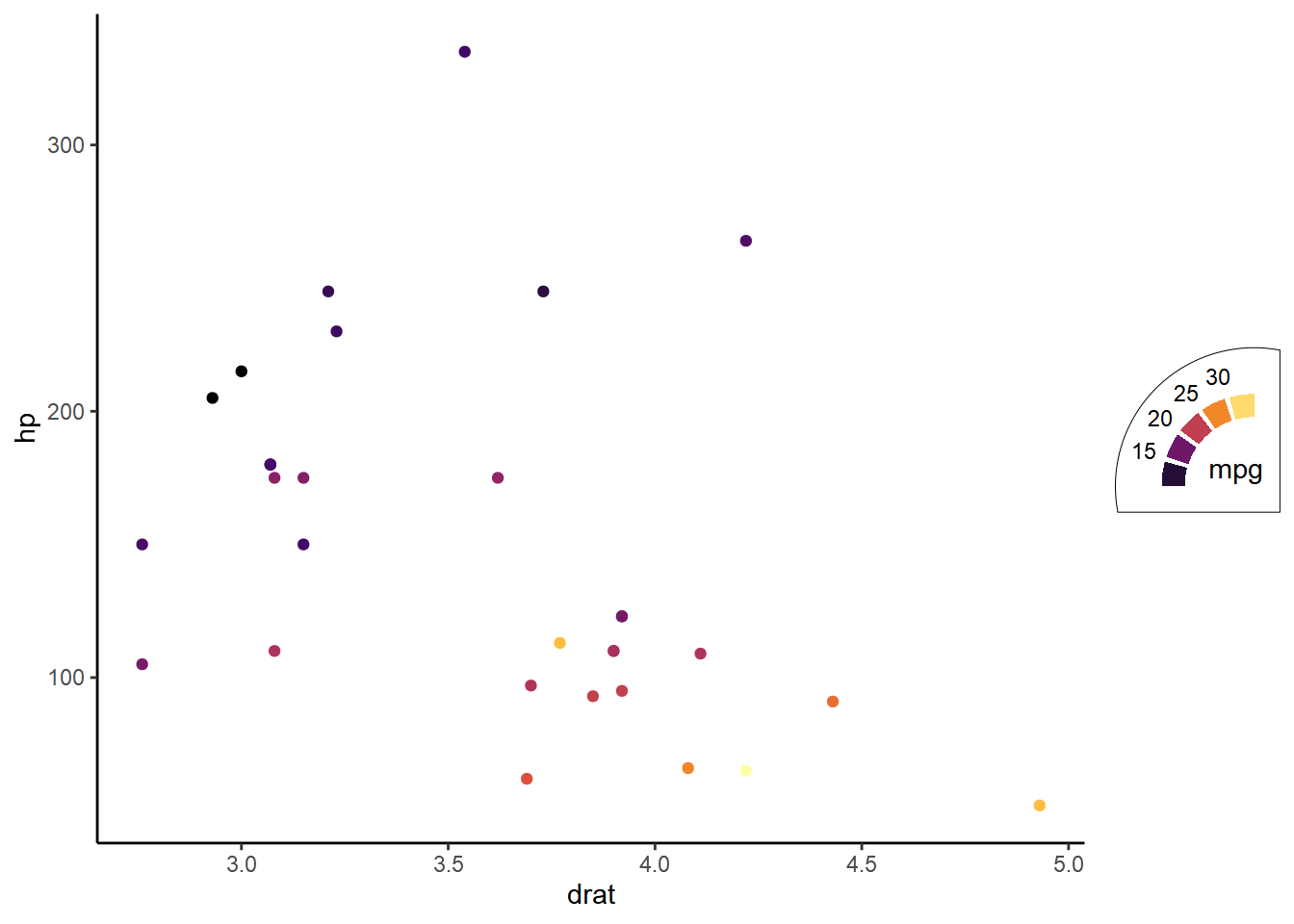
3) Label
formals(guide_colormeter)[grepl("label", names(formals(guide_colormeter)))]
#> $label.theme
#> NULL
#>
#> $label_radius
#> arc_radius * 1.25By default, the dashboard radius is derived from label_radius:
p +
scale_color_viridis_c(
option = "inferno",
breaks = scales::breaks_pretty(10),
guide = guide_colormeter(
label_radius = 1.5
)
)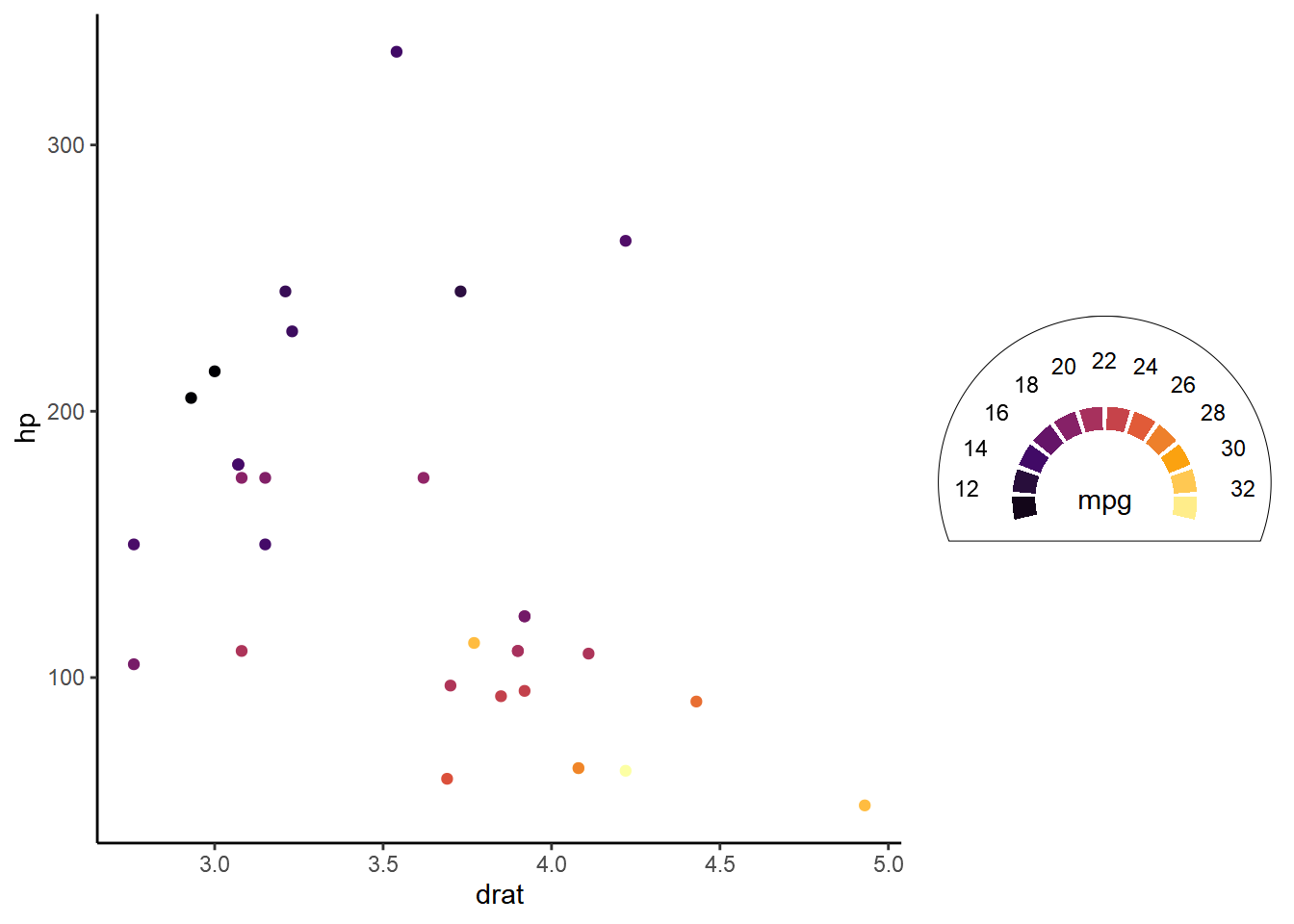
Like ggplot2::guide_colorsteps(), the argument show.limits controls labeling the limits of the scale:
p +
scale_color_viridis_c(
option = "inferno",
breaks = scales::breaks_pretty(10),
guide = guide_colormeter(
label_radius = 1.3,
show.limits = TRUE
)
)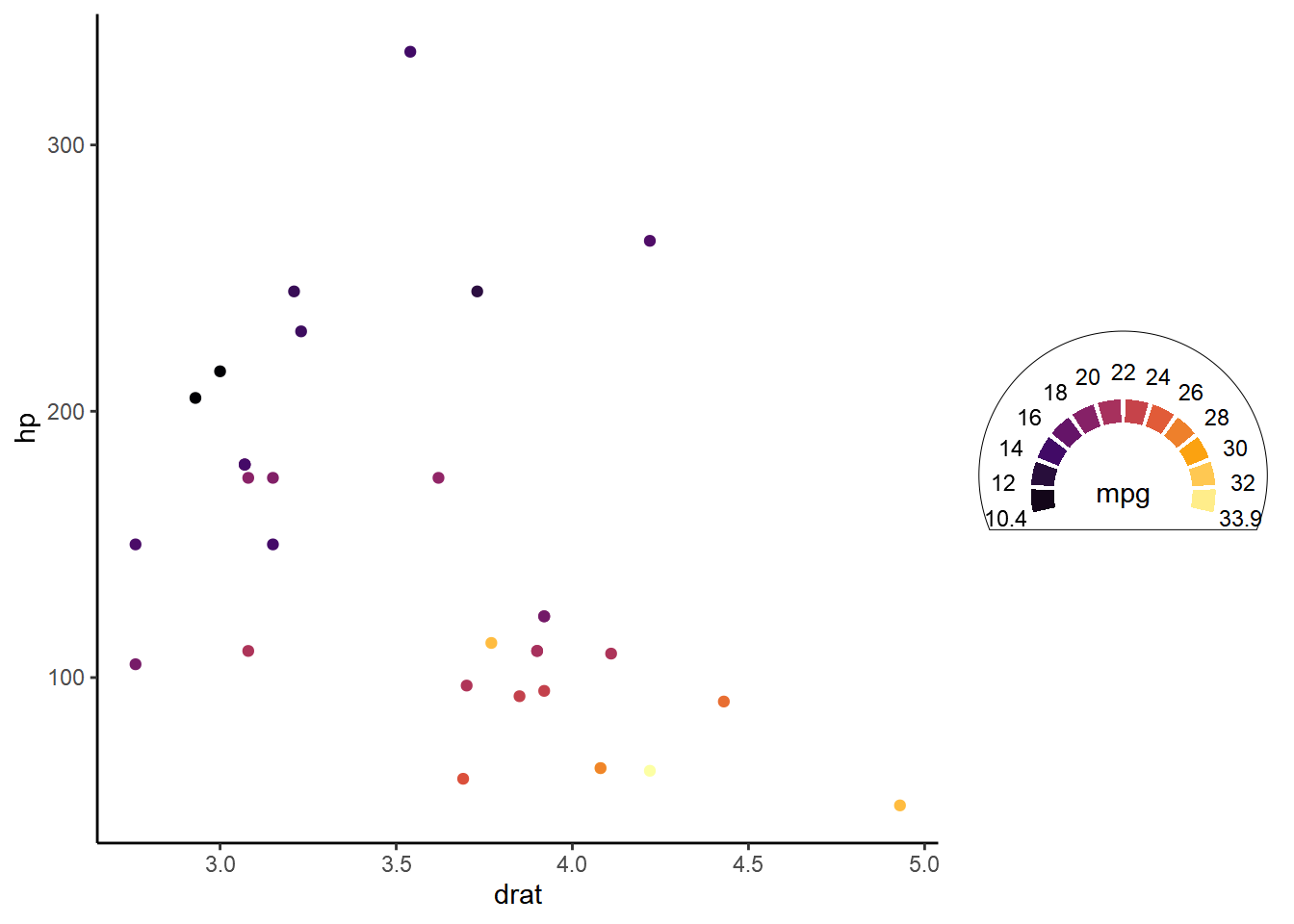
4) Dashboard
formals(guide_colormeter)[grepl("dashboard", names(formals(guide_colormeter)))]
#> $dashboard_radius
#> label_radius * 1.2
#>
#> $dashboard_color
#> [1] "black"
#>
#> $dashboard_fill
#> [1] NA
#>
#> $dashboard_linewidth
#> [1] 0.5
#>
#> $dashboard_linetype
#> [1] 1
#>
#> $clip_dashboard
#> [1] TRUE
#>
#> $close_dashboard
#> clip_dashboarddashboard_radius controls the radius of just the dashboard circle
p +
scale_color_viridis_c(
option = "inferno",
breaks = scales::breaks_pretty(10),
guide = guide_colormeter(
dashboard_radius = 1.2,
)
)
By default, the dashboard is clipped to the legend boundary, which can be turned off:
p +
scale_color_viridis_c(
option = "inferno",
breaks = scales::breaks_pretty(10),
guide = guide_colormeter(
title = "mpg<br><br>
<span style='color:darkgrey;font-size:12px'>miles per gallon</span>",
clip_dashboard = FALSE
)
) +
theme(legend.title = ggtext::element_markdown(vjust = -.6))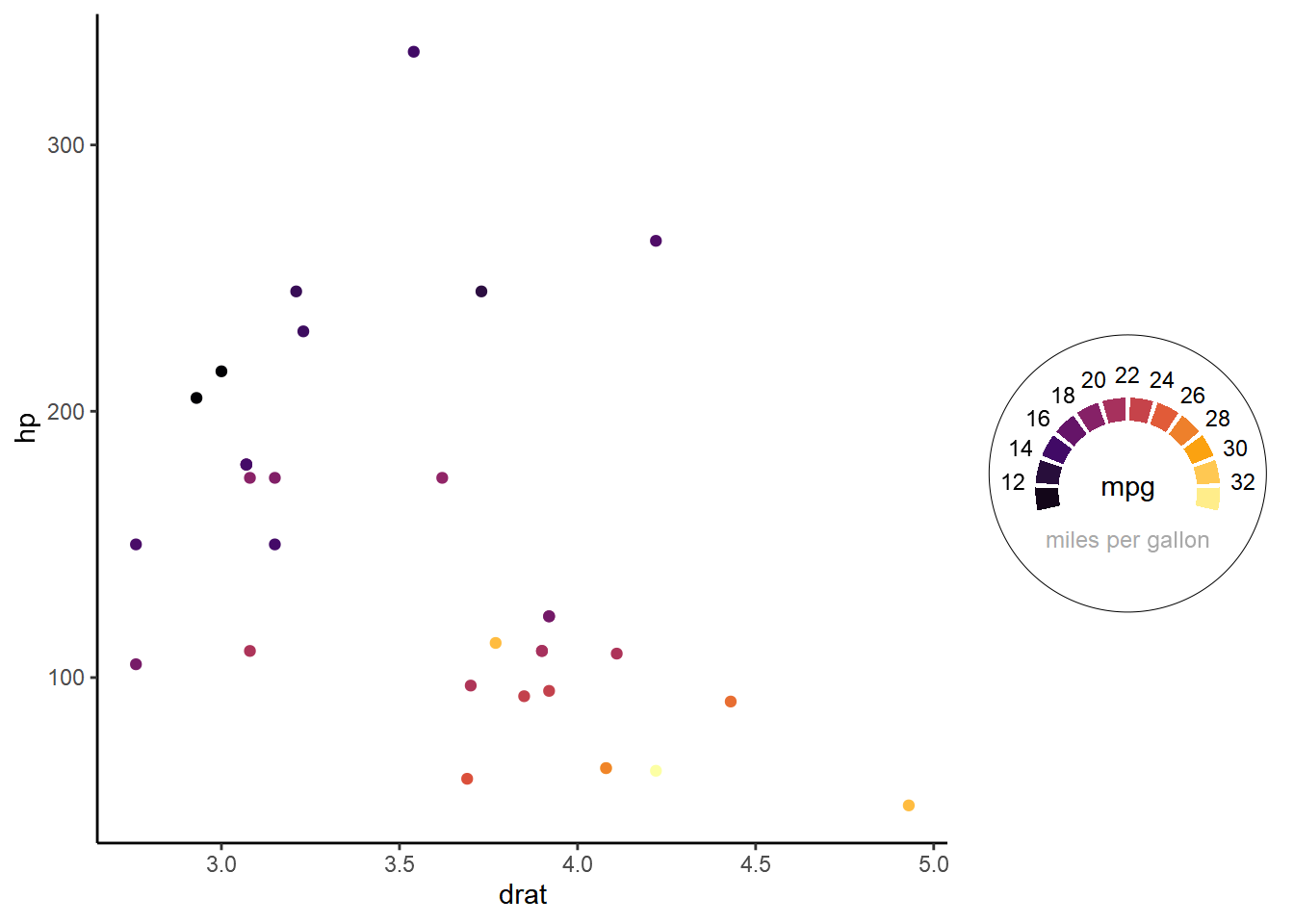
Non-positional aesthetic arguments for the dashboard:
p +
scale_color_viridis_c(
option = "inferno",
breaks = scales::breaks_pretty(10),
guide = guide_colormeter(
dashboard_fill = "skyblue",
dashboard_color = "steelblue",
dashboard_linetype = 5,
dashboard_linewidth = 4
)
)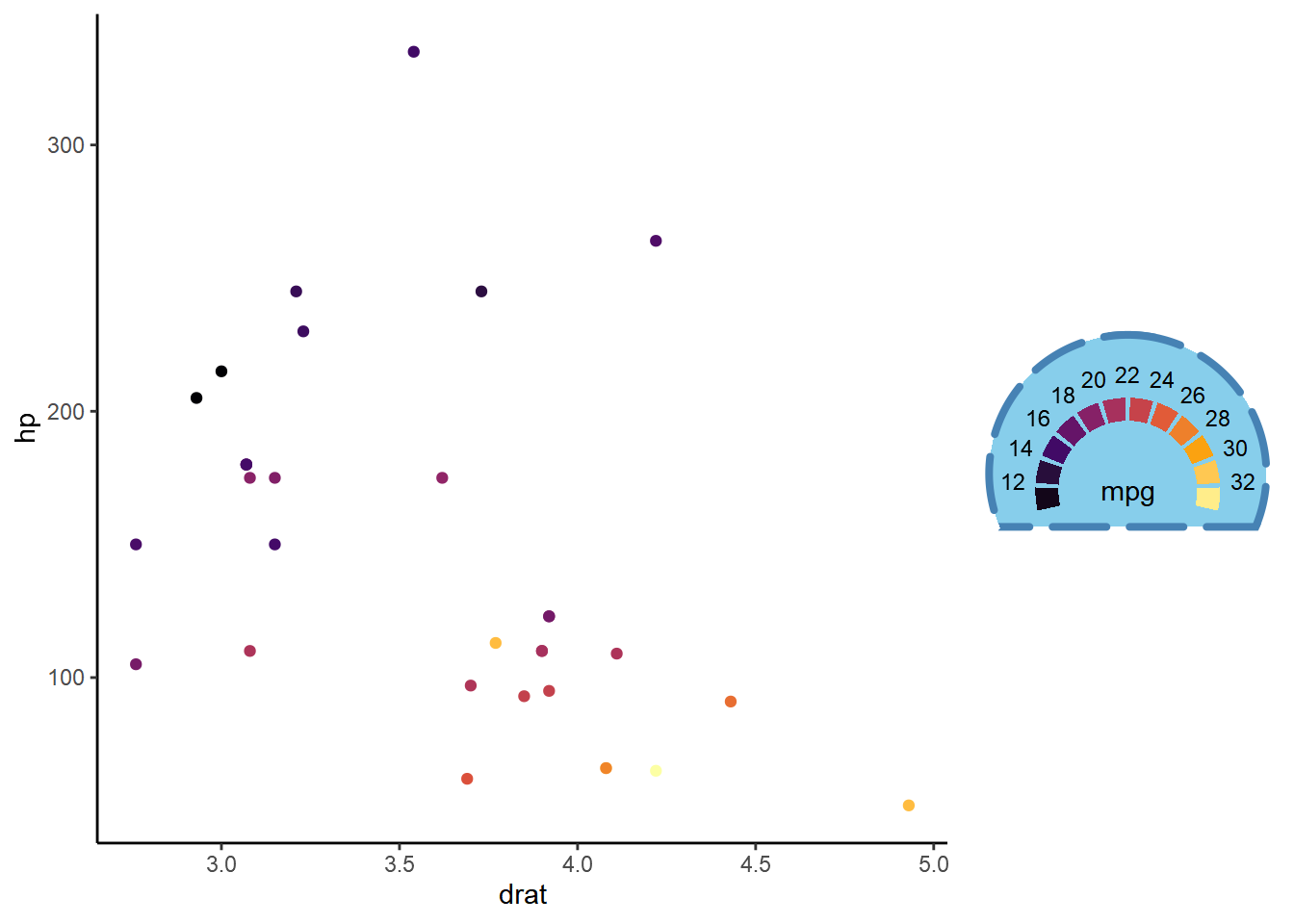
5) Frame
formals(guide_colormeter)[grepl("frame", names(formals(guide_colormeter)))]
#> $frame_color
#> [1] NA
#>
#> $frame_linewidth
#> [1] 0.5
#>
#> $frame_linetype
#> [1] 1Frames simply decorate the color arcs/bars:
p +
scale_color_viridis_c(
option = "inferno",
breaks = scales::breaks_pretty(10),
guide = guide_colormeter(
frame_color = "black",
frame_linewidth = .3
)
)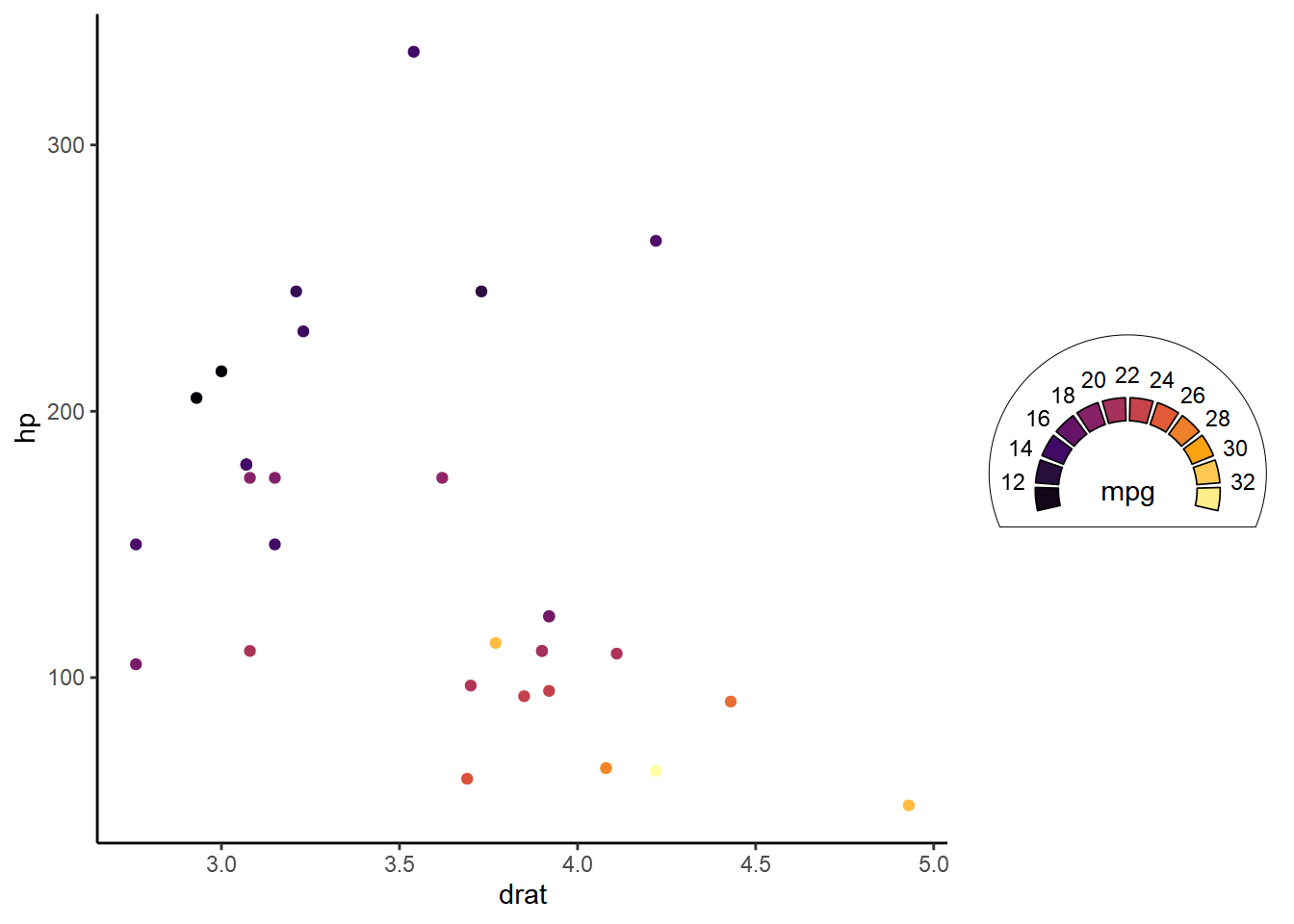
Miscellaneous
Set debug = TRUE to inspect the internal legend coordinate system (for deciding on dashboard_radius, arc_width, title_position, etc.):
p +
scale_color_viridis_c(
option = "inferno",
breaks = scales::breaks_pretty(10),
guide = guide_colormeter(debug = TRUE)
)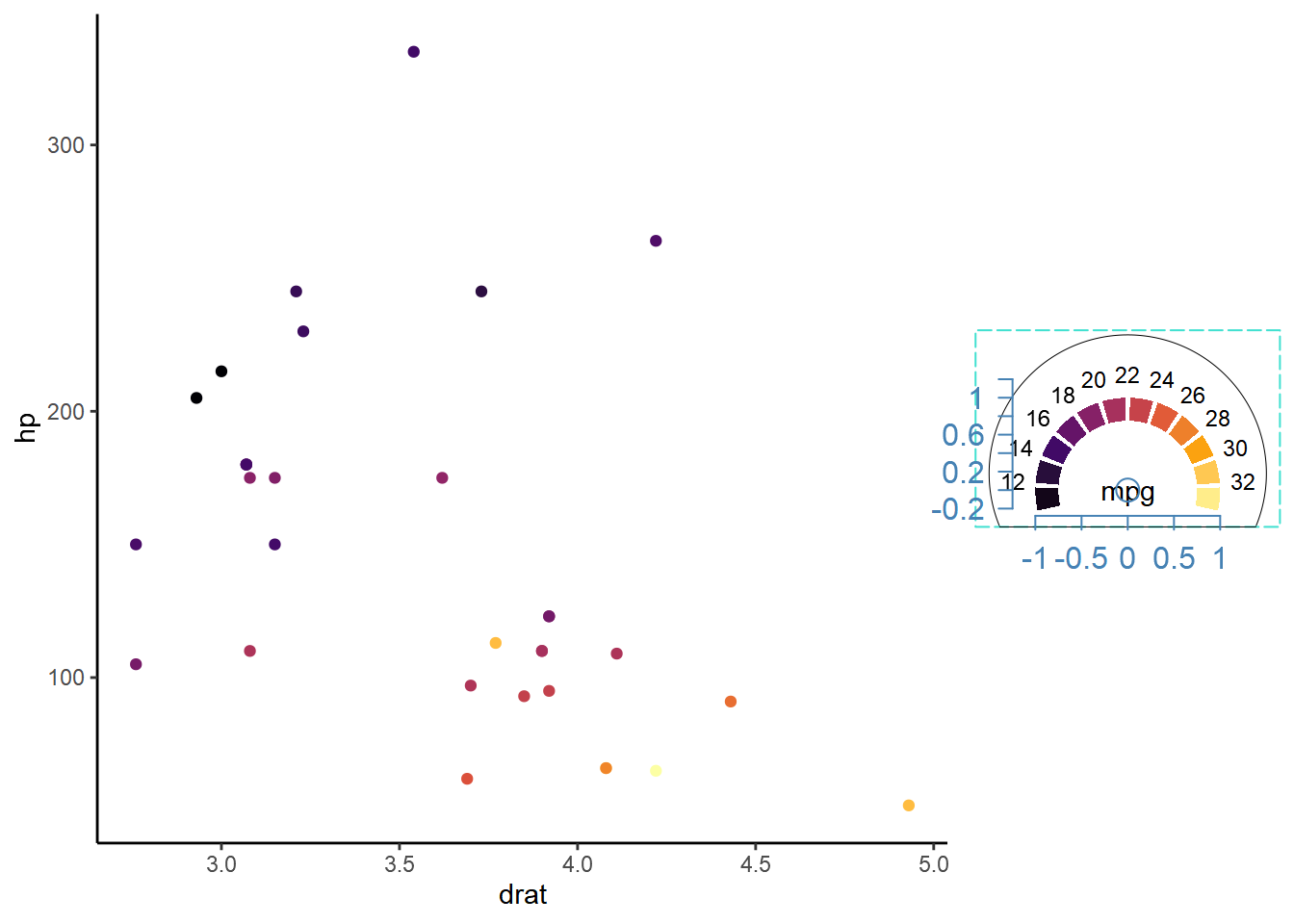
Puttings labels inside the arc:
p +
scale_color_viridis_c(
option = "inferno",
breaks = scales::breaks_pretty(5),
guide = guide_colormeter(
arc_width = 0.1,
label_radius = .7,
aspect.ratio = 1.1,
dashboard_color = NA
)
) +
theme(legend.position = c(.85, .75))
Acknowledgments
- Thomas Lin Pedersen for
{ggforce}, whose several unexported functions are used in this package.